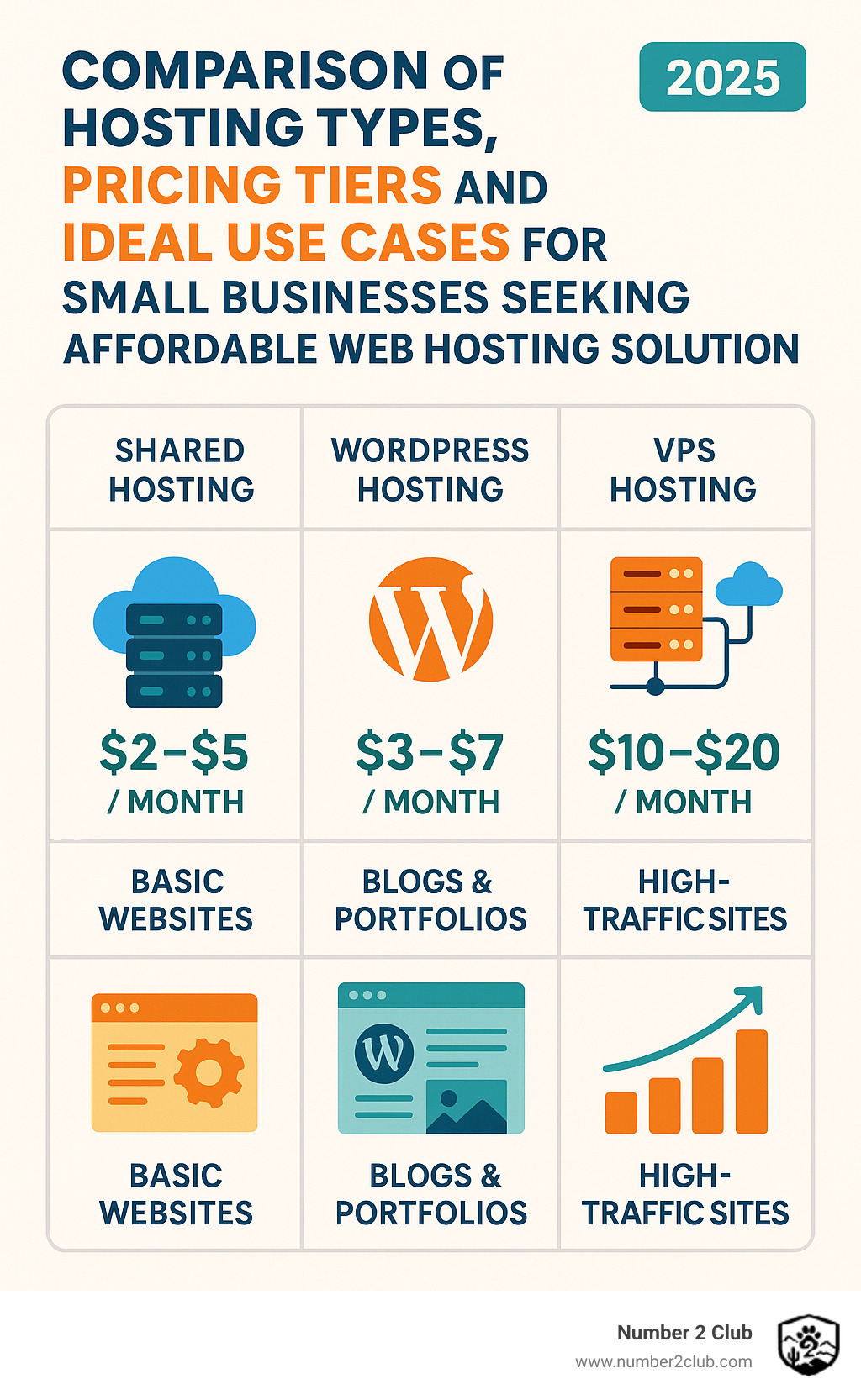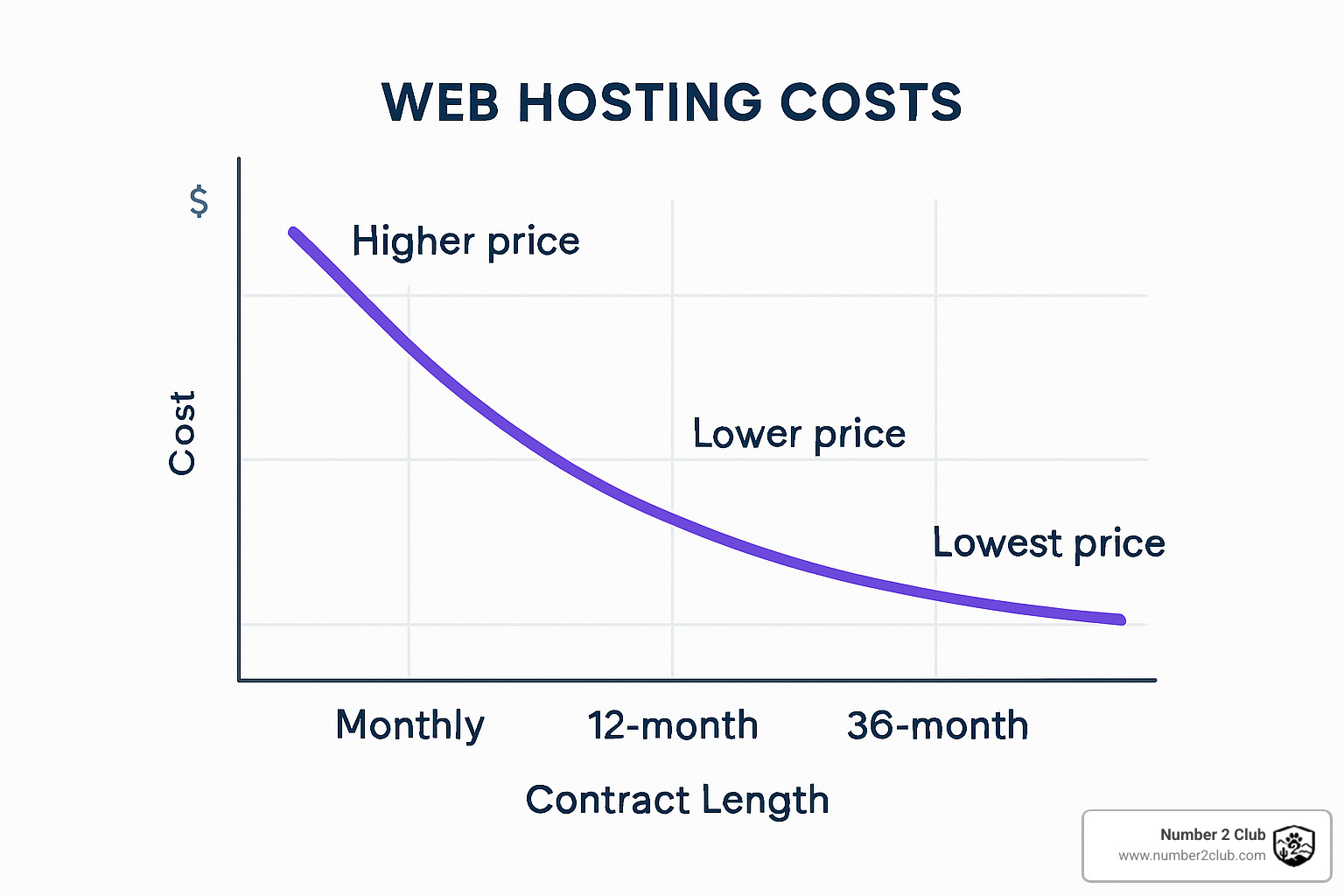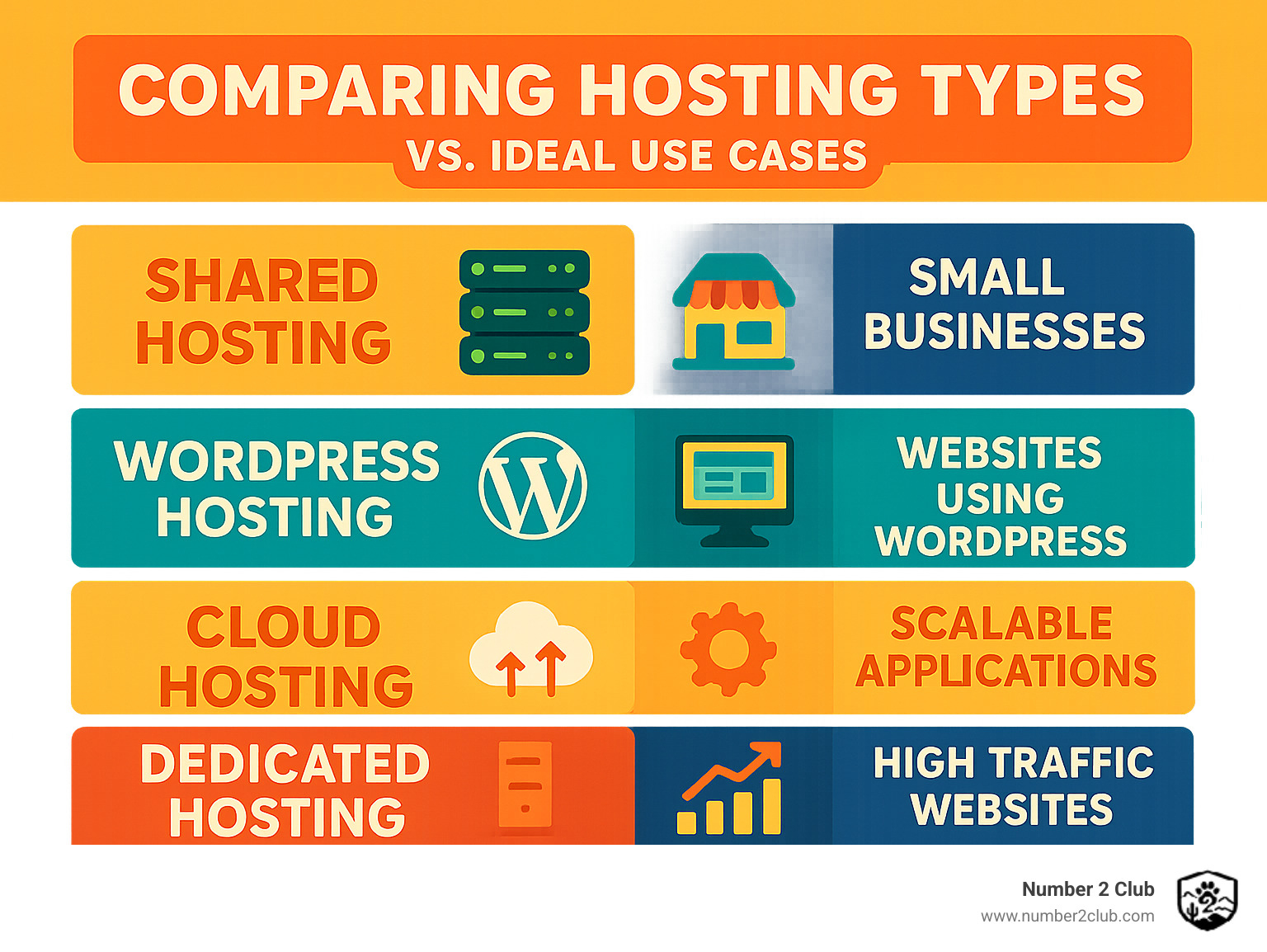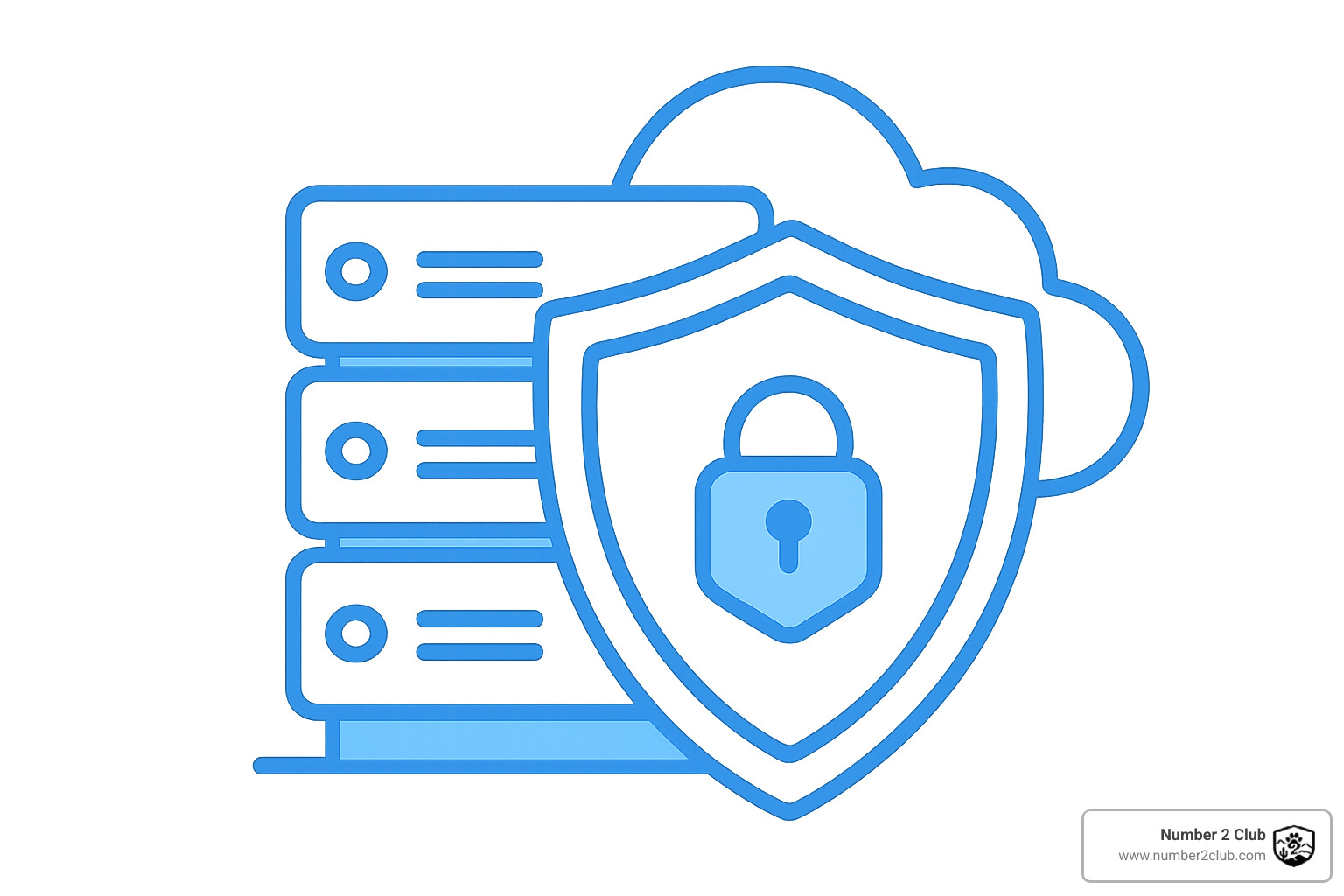Budget Bytes for Your Site – Best Inexpensive Web Hosting Options
Why Budget Web Hosting Matters for Small Businesses
Finding the best inexpensive web hosting doesn't mean sacrificing quality for your business website. Here are the top budget-friendly options that deliver reliable performance:
Top Picks for 2025:
- AccuWeb- $2.75/month with no renewal price increases
- Hostinger- $3/month (renews at $8/month) with free domain
- InterServer- $2.50/month unlimited resources
- Namecheap- $1.98/month first year, $4.48/month renewal
- Ionos- $1/month first year, $4/month long-term
Web hosting can be expensive, but it doesn't have to break your budget. The minimum cost to host a website at your own domain without ads is just $2 to $3 per month. Many providers offer 99.9% uptime guarantees and include essential features like free SSL certificates, email hosting, and one-click WordPress installation.
The key is looking beyond introductory pricing. AccuWeb's WordPress Basic plan costs $2.75 per month and doesn't increase on renewal - making it the cheapest long-term option available. Meanwhile, other hosts like Hostinger start at $3 but jump to $8 monthly after the initial term.
Smart business owners compare both intro and renewal rates before committing to any hosting plan.
I'm Joseph Lopez nc, and through my work with Number 2 Club, I've helped dozens of small businesses steer the best inexpensive web hosting options to build their online presence. My experience managing multiple client websites has taught me which budget hosts actually deliver on their promises versus those that cut corners on support and reliability.

How Web Hosting Works and Why You Need It
Imagine you're buying a house. Your website is like the house itself, the hosting service is the lot it sits on, and your domain name is the street address that helps people find you. Without that lot (hosting), your beautiful house has nowhere to exist. It's the same with websites - they need a place to live on the internet.
When someone types your domain name into their browser, something pretty cool happens behind the scenes. The Domain Name System (DNS) works like a giant phone book, instantly translating your easy-to-remember domain into the actual server address where your website files are stored. These servers aren't just sitting in someone's basement - they live in massive data centers packed with computers that hum along 24/7, keeping your site available to visitors around the clock.

For businesses looking for the best inexpensive web hosting, you'll mainly encounter three types. Shared hosting is where multiple websites share one server's resources - think of it like renting an apartment in a building with other tenants. It's the cheapest option and perfect for most small business sites. VPS hosting gives you a virtual private server with dedicated resources, like having your own condo. Cloud hosting spreads your website across multiple servers, so if one goes down, others pick up the slack - it's the most reliable but usually costs a bit more.
Here's some uptime math that actually matters for your business: A 99.9% uptime guarantee means your site could be down for about 45 minutes per month. That might sound scary at first, but it's actually the industry standard and rarely impacts real visitors. A 99.99% guarantee limits downtime to just 4 minutes monthly, which is fantastic but usually bumps up the price.
The Role of a Host, Domain, and Site Files
Your hosting account provides three essential pieces that work together seamlessly. Disk space is where all your website files, photos, and databases actually live. Most budget hosts offer 10-100GB of SSD storage, which sounds technical but is actually plenty for small business sites. Here's a reality check: a typical WordPress site with a few dozen pages and images uses less than 1GB total.
Bandwidth determines how much data can flow between your site and visitors each month. Many budget hosts now offer "unlimited" bandwidth, though this usually comes with fair-use policies buried in the fine print. Don't worry too much about this - a small business website typically uses just 1-10GB monthly, which is well within most plans.
The Content Management System (CMS) is where the magic happens for non-technical folks. Most budget hosts include one-click installers for WordPress, which powers over 40% of all websites worldwide. This eliminates the technical headache of manual installation and gets you up and running in minutes instead of hours.
Best Inexpensive Web Hosting: Key Features Checklist
When you're hunting for the best inexpensive web hosting, it's easy to get overwhelmed by flashy marketing promises. But after helping countless small businesses steer their hosting decisions, I've learned that certain features consistently separate the reliable providers from the ones that leave you frustrated.
The foundation of any good hosting plan starts with SSD storage instead of traditional hard drives. SSDs load your website pages significantly faster, which keeps visitors happy and helps your Google rankings. You'll also want a 99.9% uptime guarantee as your baseline - anything less means your site could be down for hours each month.
Free SSL certificates aren't optional anymore. They encrypt data between your website and visitors, plus Google actually penalizes sites without SSL in search results. Most budget hosts include SSL at no extra charge, but always double-check before signing up.
Here's where many people get caught off guard: renewal pricing. Some hosts lure you in with incredibly low introductory rates, then shock you with massive price increases when your contract expires.
| Provider | Intro Price | Renewal Price | Price Increase |
|---|---|---|---|
| AccuWeb | $2.75/month | $2.75/month | 0% |
| Hostinger | $3/month | $8/month | 167% |
| Namecheap | $1.98/month | $4.48/month | 126% |
| Ionos | $1/month | $4/month | 300% |
Learn more about VAT on hosting
The renewal price shock is real - some hosts increase prices by 300% after the introductory period ends. I always recommend calculating the total cost over 2-3 years, not just the first year's promotional rate.
Beyond pricing, look for daily backups included in your plan. Website disasters happen, and you don't want to find your host charges extra for backups after you've already lost important data. Quality 24/7 customer support matters too, especially when technical issues arise outside business hours.
Watch out for hidden setup fees and hosting plans with strict CPU limits that can slow your site during traffic spikes. The best budget hosts offer easy upgrade paths so you can start small and grow without switching providers.
More info about boosting traffic
Choosing the best inexpensive web hosting for beginners
If you're new to managing websites, the technical side can feel intimidating. That's why beginner-friendly features should be at the top of your priority list when selecting the best inexpensive web hosting.
One-click installers are a game-changer for newcomers. Instead of wrestling with complicated installation processes, you can set up WordPress, Joomla, or other popular platforms with literally one click. No technical knowledge required, no confusing file uploads, just point and click.
Many budget hosts now include drag-and-drop website builders that let you create professional-looking pages without touching a single line of code. You can see exactly what you're building as you build it, making the whole process much less stressful.
The control panel is where you'll manage your hosting account, so it needs to be intuitive. While cPanel is the industry standard, some hosts offer custom panels that are actually easier to steer. Look for clear menus and helpful tooltips that guide you through common tasks.
Easiest WordPress Page Builder
The best budget hosts understand that small business owners wear many hats. You shouldn't need a computer science degree to update your website, check your email, or view your traffic statistics. Simple, clear interfaces make all the difference when you're trying to focus on running your business.
Comparing renewal rates for the best inexpensive web hosting
Contract length dramatically affects your total hosting cost, and understanding these differences can save you hundreds of dollars over time. Each option comes with trade-offs that depend on your specific situation.
Month-to-month plans offer maximum flexibility but typically cost the most per month. They're perfect for testing a new host or managing temporary projects, but you'll pay a premium for that flexibility. Most promotional rates don't apply to monthly billing either.
12-month plans strike a good balance between savings and commitment. You'll get moderate discounts while keeping your options open if you need to switch providers. I recommend starting here for most small businesses - it's long enough to get decent pricing but not so long that you're stuck if things don't work out.
36-month plans deliver the biggest discounts but lock you into a long-term relationship. Only choose these extended contracts if you're confident in the provider's reliability and support quality. The savings can be substantial, but switching costs increase significantly.

Some hosts offer genuine month-to-month pricing without penalties, while others require annual commitments to access promotional rates. Always read the fine print before committing to multi-year contracts - you want to know exactly what you're paying and when those payments are due.
Product Roundup: Budget-Friendly Hosting Categories
When you're hunting for the best inexpensive web hosting, you'll find that budget-friendly options come in several distinct flavors. Each type serves different business needs, and understanding these categories helps you pick the perfect fit for your situation.
Shared hosting plans remain the most popular choice for small businesses just starting out. You're essentially sharing server resources with other websites, which keeps costs incredibly low. Most shared plans offer 50-100GB of storage and unmetered bandwidth for just $2-5 monthly. This setup works beautifully for small businesses with modest traffic - think local restaurants, service providers, or small retail shops.
WordPress-specific hosting takes things up a notch by pre-configuring everything for WordPress sites. These plans typically run $3-8 monthly and include automatic updates, security hardening, and built-in caching. If you're planning to use WordPress (and most small businesses do), this specialized hosting can save you hours of setup time.
For businesses with truly minimal needs, pay-per-use models offer an interesting alternative. Companies like NearlyFreeSpeech.NET charge only for the resources you actually consume. A very small site might cost as little as $0.25 monthly - perfect for simple business card websites or landing pages that don't get much traffic.
Green hosting options appeal to environmentally conscious business owners. These eco-friendly hosts offset their energy usage with renewable credits, often covering 300% of their actual consumption. The pricing usually falls between $2-4 monthly, so you're not paying a premium to go green.
Free hosting tiers exist, but they come with significant limitations. You'll typically get a subdomain-only address and have to display the provider's advertisements on your site. While free sounds appealing, most serious businesses quickly outgrow these restrictions.

The performance versus price balance is always a consideration. Shared hosting at $3 monthly won't match the speed of a $50 monthly dedicated server, but it's perfectly adequate for most small business websites receiving under 10,000 monthly visitors. The key is being realistic about your actual needs versus your wishlist.
Keep in Touch with Site Visitors and Boost Loyalty
Under $3/Month Essentials
The ultra-budget category might surprise you with how much you can actually get for your money. These bargain-basement plans often include features that would have cost extra just a few years ago.
Single-site hosting works perfectly for businesses with one primary website. You'll typically get 20-50GB of storage, which easily handles thousands of pages and images. Unless you're planning to upload massive video files or run multiple websites, this storage limit rarely becomes an issue.
Professional email comes included with most sub-$3 plans. You'll get email addresses like info@yourbusiness.com with 1-5GB of mailbox storage. This beats using Gmail or Yahoo for business correspondence and looks much more professional to customers.
SSL certificates now come standard, even on the cheapest plans. This security feature used to cost extra, but hosting companies realized that free SSL certificates are crucial for customer trust and search engine rankings. Your visitors will see that reassuring padlock icon in their browser.
At this price point, you might encounter some limitations. Most ultra-budget plans restrict you to a single website per account. Customer support often means email or chat only - no phone support. You're also sharing server resources with other websites, which could occasionally cause slowdowns during peak traffic times.
Month-to-Month Flexibility
Some businesses need hosting without the commitment of long-term contracts. Maybe you're running a seasonal business, testing a new venture, or simply prefer the flexibility to change providers without penalty.
Month-to-month billing eliminates the pressure of annual commitments. Providers like InterServer offer this flexibility without price penalties, charging the same rate whether you pay monthly or annually. This approach works great for seasonal businesses that might only need hosting part of the year.
Easy upgrade paths become crucial as your business grows. The best budget hosts make it simple to move from shared hosting to VPS hosting when you need more resources. You shouldn't have to migrate your entire website to a new provider just because you outgrew your current plan.
Staging sites represent a more advanced feature that some budget hosts include. These staging environments let you test changes to your website before making them live. It's like having a sandbox where you can experiment without breaking your actual site.
This flexibility typically costs $1-3 more per month than annual contracts, but the peace of mind is worth it for many businesses. You're paying a small premium for the option to walk away if things don't work out.
Free but Limited Alternatives
Truly free hosting does exist, but it comes with trade-offs that make it unsuitable for most serious businesses. Understanding these limitations helps you decide whether free hosting might work for your specific situation.
Subdomain-only addresses mean your website becomes something like "yourbusiness.provider.com" instead of "yourbusiness.com." This arrangement immediately signals to visitors that you're using free hosting, which can hurt your professional credibility.
Advertisements appear on your site because the hosting provider needs to cover their costs somehow. These ads often have nothing to do with your business and might even promote competitors. You have no control over what gets displayed.
Community support replaces dedicated customer service. When something goes wrong, you're relying on forums and documentation rather than getting help from actual support staff. This works fine if you're technically inclined, but can be frustrating for business owners who just want their website to work.
Free hosting works perfectly for personal projects, testing new ideas, or learning web development. However, serious businesses need the credibility of their own domain and an ad-free experience to build trust with customers.
Performance, Security & Support on a Shoestring
You might think budget hosting means slow websites and poor security, but that's not necessarily true. The best inexpensive web hosting providers understand that small businesses need solid performance and protection just as much as enterprise clients do.
Performance doesn't have to break the bank. Most quality budget hosts now include LiteSpeed web servers, which are significantly faster than the older Apache servers many expensive hosts still use. It's like getting a sports car engine in an economy car - sometimes the budget option actually performs better.
Built-in caching is another game-changer that's becoming standard even on $3/month plans. This technology stores frequently-accessed parts of your website in memory, so pages load almost instantly for your visitors. When combined with SSD storage instead of slower mechanical drives, your budget website can feel surprisingly snappy.
Many budget providers also include Content Delivery Networks (CDN) that serve your images and files from servers closest to each visitor. This means someone in Japan sees your website just as quickly as someone in your hometown.
Security shouldn't be a luxury item. Every reputable budget host includes free SSL certificates, which encrypt the connection between your website and visitors. This little green padlock in the browser address bar is crucial for customer trust and search engine rankings.

Daily automated backups are another essential that good budget hosts include. While we always recommend keeping your own backups too, it's reassuring to know your hosting provider has your back if something goes wrong. Malware scanning and basic firewalls round out the security package, protecting your site from common threats.
Support quality varies more than any other feature in budget hosting. The best providers offer 24/7 live chat with knowledgeable staff who can actually solve problems, not just read from scripts. Email ticketing systems are standard, though response times can range from minutes to days depending on the provider.
Comprehensive knowledge bases and tutorial libraries are often more valuable than you'd expect. Many common issues can be resolved immediately with a good search through the help documentation, rather than waiting for support tickets.
Phone support is less common on budget plans, but honestly, live chat is often faster and more convenient anyway. You can multitask while waiting for responses, and chat transcripts give you a record of the conversation.
Learn more about tax rate exemptions
The secret is finding providers that don't cut corners on these fundamentals. A $2/month host that includes daily backups, malware scanning, and responsive support offers much better value than a $5/month host that skimps on protection and leaves you hanging when problems arise.
Frequently Asked Questions about Best Inexpensive Web Hosting
What's the minimum cost to host a full-domain, ad-free website?
You can get your business online with a professional domain and zero ads for just $2-3 per month. That's less than most people spend on coffee in a single day, yet it gives you complete control over your online presence.
At this price point, you'll get everything essential for a small business website: 10-50GB of storage space, unlimited bandwidth, a free SSL certificate for security, basic email accounts with your domain name, and one-click WordPress installation.
AccuWeb stands out here because their $2.75/month plan stays at that price forever - no sneaky renewal increases that catch you off guard later. When you're running a tight budget, that price stability makes a huge difference for planning your expenses.
How much storage and bandwidth does a basic site really need?
Here's the reality check most hosting companies won't tell you: your small business website probably needs way less than you think.
A typical business site with 20-50 pages, a photo gallery, and contact forms uses just 1-5GB of storage. That includes your WordPress installation, theme files, plugins, and dozens of high-quality images. Even if you add a blog and post regularly, you're unlikely to hit 10GB in your first year.
For bandwidth, most small businesses use 1-10GB monthly unless they're streaming videos or getting viral traffic. To put this in perspective, a visitor viewing 10 pages with images uses about 5MB of bandwidth. You'd need thousands of monthly visitors to approach even basic bandwidth limits.
The cheapest hosting plans offer 20-100GB storage and unlimited bandwidth, which is massive overkill for most businesses. Don't let salespeople convince you that you need premium resources when the best inexpensive web hosting plans already give you room to grow for years.
Do budget hosts still include free SSL, domain, and email?
The good news is that free SSL certificates are now standard across virtually all hosting plans, even the cheapest ones. This wasn't always the case, but competition has made SSL a basic expectation rather than a premium feature.
Free domains come with most annual hosting plans, but there's a catch worth knowing about. The domain is typically free for the first year only, then becomes a recurring cost of $10-15 annually. It's still a great deal, but factor this into your long-term budget so you're not surprised when renewal time comes.
Free email hosting is included with most budget plans, letting you create professional addresses like info@yourbusiness.com or sales@yourbusiness.com. The catch here is usually storage limits - you might get 1-5GB per email account, which is plenty for most small businesses but could fill up if you receive lots of large attachments.
The key is reading the fine print and understanding what stays free versus what becomes a recurring cost. The best budget hosts are transparent about these details upfront rather than hiding them in complicated terms of service.
Conclusion
You've made it through the maze of best inexpensive web hosting options, and hopefully, you're feeling more confident about choosing the right provider for your business. The truth is, finding quality hosting on a budget isn't about finding the cheapest option - it's about finding the smartest value.
The math is simple: AccuWeb's price-lock guarantee at $2.75 monthly beats providers that start at $1 but jump to $8 after year one. Hostinger's beginner-friendly tools make website management a breeze, even if you've never touched a hosting account before. InterServer's genuine month-to-month flexibility gives you freedom without financial penalties.
Here's what really matters when you're ready to make your decision: Calculate the total cost over 2-3 years, not just that tempting first-year price. Make sure your provider guarantees 99.9% uptime and includes free SSL certificates as standard. Choose someone with easy upgrade paths, because hopefully your business will grow and need more resources down the road.
Most importantly, don't get fooled by renewal pricing tricks. I've seen too many small business owners at Number 2 Club get caught off guard when their hosting bill triples after the introductory period ends. A little homework upfront saves you from budget headaches later.
The good news? You can host a professional website for just $2-3 monthly without sacrificing quality. The providers we've covered offer enterprise-level features at prices that won't stress your startup budget. Cheap hosting doesn't mean corner-cutting when you choose wisely.
Your website is often the first impression customers have of your business. With the right budget hosting provider, you can make that impression count without breaking the bank. Smart shopping today means more money in your pocket tomorrow - and that's always a win in my book.











